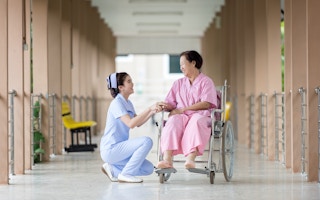With Covid-19 imposing new challenges on women and exacerbating the numerous other difficulties they already face in their daily lives, a gender-sensitive response is crucial to this global health emergency.
So what do we know about the impact of COVID-19 on women and what would a gender-sensitive response look like?
Historically, women played three key roles in households, communities, and societies - mothers, nurses, and teachers. This continues today as gender stereotypes prevail in our societies and they influence career choices made by women and men.
The World Health Organisation (WHO) estimates that women make up almost 70 per cent of healthcare workers around the world. Moreover, women continue to make up the majority of health facility service staff (cleaning and housekeeping, laundry and food services).
“
Providing support through targeted social assistance schemes for women during this pandemic and ensuring women’s access to finance is pivotal for a speedy recovery and long-term economic and social improvements.
These healthcare workers and service staff are on the front lines of the fight against Covid-19 and, as such, are at a greater risk of being infected.
In some countries, there have been reports of female nurses experiencing difficulties finding smaller-sized personal protective equipment and getting access to feminine hygiene products.
We also know that many women around the world bear much of the responsibility for child and elderly care, and on average perform three times more unpaid care work than men.
With offices being shut down, many women around the world are losing their jobs and income, as many of their professions prevent them from working remotely. As it generally takes longer for women to recover their income, they are at a greater risk.
On top of that, juggling domestic responsibilities and child and elderly care is a challenge in itself, but with schools shutting down, the pandemic exacerbates these challenges.
With many women expected to take the responsibility for taking care of family members infected by Covid-19, these social and economic burdens will only be intensified.
There are other numerous challenges that arise during a global health emergency. Much of the research shows an increase in domestic violence associated with isolation and lockdowns.
With the pandemic presenting more challenges, victims of gender-based violence may be unable to receive the life-saving care and treatment, report such cases, or even escape, as hospitals, police stations, and other institutions are overburdened with handling cases related to the virus or not operating.
In its 2018 report, UNICEF highlighted that women and children are at greater risk of exploitation and sexual abuse during public health outbreaks, as was seen during the Ebola outbreak in West Africa.
With more governments implementing lockdowns, we must pay attention to the sex-disaggregated data when developing a gender-sensitive response.
The decision makers need to be mindful of gender issues and ensure that they are taken into account as we seek solutions in response to, and recovery from, the Covid-19 pandemic. It’s clear that pandemics worsen existing inequalities experienced by women and girls.
As such, there is a need for immediate solutions and policies that will prevent the worsening of gender inequalities and widening of the gender gap.
For starters, ongoing problems and issues experienced by women healthcare workers need to be addressed. At a minimum, women caregivers and frontline responders should be provided proper personal protective equipment (PPE), including feminine hygiene products for those working longer shifts.
Additionally, during this pandemic, it is crucial that women and girls have access to adequate maternal and pediatric care, reproductive health services and essential information.
Moreover, as more women continue to lose their jobs and steady sources of income as a result of the pandemic, it is critical that necessary targeted support is provided to ensure food security to prevent these vulnerable individuals from succumbing to negative coping mechanisms.
And last but not least, the issue of increasing incidents of gender-based violence which have been reported by many countries is vital to be addressed.
Some countries have recently introduced policies and special measures to address this phenomenon including by introducing alternative reporting mechanisms, remote services delivered via mobile phone or messaging apps, and supporting shelters for gender-based violence survivors.
It is crucial to continue developing and adapting such measures to ensure that the most vulnerable receive necessary support.
As policies and recovery plans are developed, it is imperative that long-term targeted economic and gender empowerment strategies are embedded to mitigate the impact of this pandemic and future outbreaks.
To do so, data related to the outbreak must be disaggregated by sex, age, and other criteria, to accurately reflect the different challenges in different demographics arising from the pandemic.
Policy makers need to be mindful of ways to support further economic development and post-pandemic recuperation.
Lastly, as more small businesses collapse and demand for informal work arrangements decreases, women will continue losing financial independence, affecting their empowerment in the short term, with potential longer-term impacts on children’s schooling (particularly for girls).
This, could result in adverse effects on female labor force participation for the next generation.
Providing support through targeted social assistance schemes for women during this pandemic and ensuring women’s access to finance is pivotal for a speedy recovery and long-term economic and social improvements.
In the efforts to restore the economy, the inspiration should be to use this opportunity and develop a socio-economic system that is capable of delivering gender parity.
Malika Shagazatova is Social Development Specialist (Gender and Development), Sustainable Development and Climate Change Department at ADB. This article is republished from the ADB Blog.






















